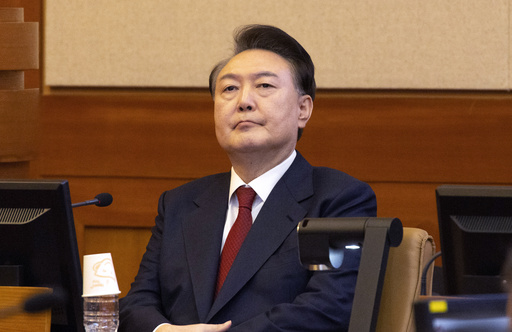SEOUL, South Korea — South Korean President Yoon Suk Yeol is embroiled in a significant political situation as he fights for his position at Seoul’s Constitutional Court following his impeachment and arrest due to a controversial martial law declaration last year. With hearings concluding, the court is moving closer to a verdict that will either solidify his removal from office or reinstate him to power.
Yoon’s legal difficulties also include a separate criminal indictment related to rebellion charges, bringing the nation’s democracy into question amid rising political division and mistrust. Tensions escalated when supporters of Yoon’s conservative party clashed with law enforcement outside a Seoul courthouse that sanctioned his arrest. Meanwhile, Yoon’s legal representatives and the ruling party have openly cast doubt on the integrity of the judicial and law enforcement systems, as Yoon himself has shown disdain for his political adversaries by endorsing unfounded theories regarding election fraud to defend his controversial authoritarian actions.
Should the court decide to remove Yoon from office, a presidential by-election would ensue, putting a spotlight on the public’s faith in the electoral system. Conversely, reinstating him might lead to further turmoil if perceived as an unfair decision by the populace. The ruling from the Constitutional Court, anticipated by March 2024, marks a pivotal moment in South Korea’s political landscape.
Under the South Korean constitution, while the National Assembly has the authority to impeach a president, it does not have the legal power to remove one. Following the impeachment process, a trial is conducted at the Constitutional Court, which has a 180-day period to decide whether to remove a president or reject the impeachment, restoring full presidential powers. If Yoon is ousted, elections must occur within 60 days to find a successor. Specifically, Yoon was charged with misusing military force, bypassing legal procedures to announce a state of emergency, and attempting to dissolve the legislature; however, the court’s primary concern is whether he can sustain his presidency. A minimum of six out of the eight justices must vote to remove him.
Central to the case is whether Yoon’s declaration of martial law was legally valid. The court is examining if he had appropriate reasons for declaring martial law on December 3, which the constitution restricts to circumstances of war or equivalent national crises. Yoon has argued that his declaration was necessary due to what he labeled as a “hostile” liberal opposition that misused its majority to obstruct his policies. After gaining a significant legislative victory the previous year, the opposition initiated impeachment procedures against several of Yoon’s key officials and stifled his budget proposal, creating what Yoon’s camp described as a crisis that warranted emergency measures.
However, Yoon’s National Security Director, Shin Won-shik, testified that Yoon had suggested using emergency powers even before the general elections scheduled for the following April, raising questions about the necessity of his martial law declaration. Additionally, the National Assembly accused Yoon of ignoring constitutional requirements about convening a formal Cabinet meeting prior to issuing the martial law proclamation.
Although Yoon convened 11 Cabinet members for a brief meeting before announcing the martial law on television, many attendees, including Prime Minister Han Duck-soo, claimed that the gathering did not constitute an official meeting, as Yoon primarily informed them rather than engaging in genuine discussion. The proceedings did not adhere to established protocols for formal state council meetings—no agenda was presented, signatures were not gathered, and no official minutes were recorded. Yoon later contended that electronic approvals could serve as retroactive records.
Several high-ranking officials voiced their concern over Yoon’s martial law decision, emphasizing the potential harm to South Korea’s international standing and economy. Yoon nonetheless proceeded with his declaration, asserting that he had a different interpretation of the situation. Former Interior Minister Lee Sang-min was the sole participant to claim that the Cabinet discussion was productive, stating that officials debated passionately during the session. Yoon countered claims that the Cabinet members were merely present for casual interactions.
Lastly, the Assembly leveled accusations against Yoon for allegedly attempting to dissolve the legislature—a power that he does not possess, even under martial law. Following his declaration, a military order was issued forbidding all political activities, which included gatherings by the National Assembly. Troops were dispatched to the assembly premises, where they even attempted to disrupt proceedings. However, legislators managed to establish a quorum and unanimously voted to repeal the martial law.
Yoon maintains that his intent was to issue a temporary warning to the liberal opposition and that he would have respected the will of the legislature had they chosen to lift the martial law. He insisted that the military’s presence was meant to ensure order rather than counter legislative processes. Yet, testimonies from military leaders indicated a deliberate attempt to exert control over the legislature, a plan obstructed by civilians and legislative personnel who aided lawmakers.
In addition, numerous troops were positioned at National Election Commission offices the same day, a move Yoon defended as necessary to investigate unverified allegations of electoral fraud. The political crisis facing Yoon may have profound implications for South Korea’s democratic stability in the coming months.
This website uses cookies so that we can provide you with the best user experience possible. Cookie information is stored in your browser and performs functions such as recognising you when you return to our website and helping our team to understand which sections of the website you find most interesting and useful.
